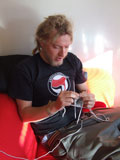Archive for the Environment Category
I never knew the European hamster was threatened. You learn something new every day.
Today I came across an article from telegraph.co.uk about EU stating that they will punish France with a multi-million pound fine if they do not take measures to save hamsters in Alsace, eastern France. According to Wikipedia Alsace is the last place in Western Europe where you can find the European hamster, also known as Black-bellied hamster. The population of hamsters in Alsace is under threat too because the hamsters has traditionally been seen as a vermin and been killed. In later years the local farmers has gone from producing food that hamsters like to eat to growing maize which is not ripe when the hamsters wake up from the winter sleep. This has made food sources scarce for the hamsters and their numbers has dwindled from 1,167 in 2001 to 161 only last year!
I hope EU is successful in pressuring France to protect the European hamster.
Very cool news from Mexico! According this Reuters article Mexico City is planing to improve the environment by turning 9,300 square meters of publicly owned roof space each year with grass and bushes to help prevent global warming by absorbing CO2. The city will also offer tax reductions for companies or individuals who want to do the same with their buildings. Mexico City is known for all the pollution so I hope this will help the problem as nature really is the best at cleaning up our mess.
This is a really great initiative from the Major of Mexico City (he is also building bicycle paths and provide some car-free roads on weekends).
While reducing CO2 levels is important this could be taken to next level by using the same method to create urban gardening/farming. Think about all the food that could be produced on the top of buildings. With the rising prices of food this might happen without the help of the government since people will have to do it out necessity. Locally produced food also helps reducing CO2 since you don’t have to ship the food across the planet. Read more about urban gardening on this site.
This could be some really bad news for the environment in Australia. According an article on cairns.com.au Roger Bradbury, a professor at Australian National University, predicts that if the over fishing at the Great Barrier Reef continues it will turn into a dead zone filled with slimy creatures. He says that the large marine species are keeping in check jellyfish and algae. If the large species were to disappear or the populations are heavily reduced “you get an ocean that’s like swarms of jellyfish, blooms of algae,” Roger Bradbury said.
The professor want to immediately phase out the commercial fishing at the Great Barrier Reef to save the remaining stocks, but of course those who decide are a bit skeptical to stop the fishing. Fishing = big money.
When I read this article I kept thinking about if this could happen here in Northern Norway too. Last year no big shoals of coalfish came into our fjord and that is the first year I have ever experienced that. Some fishermen claimed that this was because there was a big bloom of algae. Could it be that the bloom of algae was caused by over fishing? This spring I have also observed massive quantities of jellyfish swimming around which I find a bit worrying.
I hope this is not a sign of over fishing in my area.
This is some very depressing news about the rainforests in Papua New Guinea. According to an article on bbc.co.uk satellite images have revealed how the rainforests in Papua New Guinea have been rapidly cut down over the last 30 years. If the deforestation continues at the same speed more than half of the country’s forests will be lost by 2021!
The rainforests in Papua New Guinea is actually the world’s third largest rainforest and contains an estimated 6-7% of the planet’s species so this region is very important.
Although there has been some conservation measurements to protect the area it seems to have failed because there are being cut down as many trees within the protected zones as there are outside them.
I hope the Papua new Guinea government takes this serious and really protect the important rainforests. The Western world should also help poorer countries since they often have their main income from natural resources like timber.
The big logging companies should be punished for their criminal behavior and be put out of business! One thing we as consumers can do is boycotting wood coming from endangered rainforests. Check out rainforestweb.org for more information on how you can help the rainforests.
Seems like my country, Norway, is doing something positive for the nature. According to this article on bbc.co.uk Norway will capture 3 or 4 beaver families this autumn. In the spring of 2009 these beaver families will be released into the wild in Scotland and hopefully establish a big population of beavers.
Over 400 years ago beavers went extinct in Scotland due to too much hunting so this reintroduction will bring back a natural part of the Scottish wildlife.
There will be a trial period of 5 years so the Scottish Natural Heritage can monitor how the reintroduction will impact the local environment (beavers can cause some problems with their big dams). If the 3-4 beaver families turn into a success story more beavers will be reintroduced to other parts of Scotland.
In other parts of Europe reintroduction of beavers has been very successful. Lets keep our fingers crossed that this will be the case in Scotland too, giving the Scots a richer wildlife.
This is some really great news! According to an article on the therecord.com Daniel Burd, a 16 year old student from Canada, has isolated some microbes that are able to decompose plastic bags in a matter of 3 months. He added yeast to water to make a good growth medium for microbes. Then he tried to isolate the microbes using agar dishes and he found out that a combination of two different microbes worked best for degrading plastic bags.
Plastic bags is a big problem for the environment so kudos to Daniel Burd for caring. My only worry is if the dissolved plastics bags contains harmful toxins making that a waste problem too.
Of course we could always stop using plastic bags and instead use bags made out of organic cotton or hemp.
Found this news on the thestar.com about 200 cyclists blocking the traffic on a big expressway in Toronto, Canada. The cyclists was able to shut down the road for almost half an hour as they cycled about 7 km before the police arrived. 4 people were arrested due to refusing to leave the road. Solidarity to them!
Seems like the great organization Critical Mass was behind this action. Critical Mass is a leaderless event where cyclists gather to protest for example the traffic that is killing our planet.
I have been a part of similar actions where we blocked a street. It was a lot of fun, but also a bit scary when the rich people with expensive cars wanted to run us over.
Here is some pictures (source is Toronto Traffic Cameras) of the protest in Toronto.

Found an interesting article by nwf.org about the effort being made in USA to restore and save many of the endangered butterfly species on that continent. 23 species in threatened in the US due to habitat loss, pollution, global warming and invasive species. The butterflies are also facing other problems because of how specialized they are.
In addition to saving their natural habitats some conservationists are using captive-breeding program to try boost the population of some butterfly species.
In my opinion we need to stop the negative trend where we turn every little piece of land into places that “benefit” humans and start to little by little restore the nature so we don’t make all these species go extinct.


